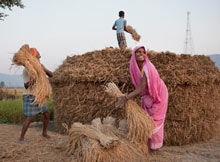"It
is a set of ideas, the absolute opposite to the first green
revolution [of the 60s] which said that you had to change the genes
and the soil nutrients to improve yields. That came at a tremendous
ecological cost," says Uphoff. "Agriculture in the 21st
century must be practised differently. Land and water resources are
becoming scarcer, of poorer quality, or less reliable. Climatic
conditions are in many places more adverse. SRI offers millions of
disadvantaged households far better opportunities. Nobody is
benefiting from this except the farmers; there are no patents,
royalties or licensing fees."
For
40 years now, says Uphoff, science has been obsessed with improving
seeds and using artificial fertilisers: "It's been genes, genes,
genes. There has never been talk of managing crops. Corporations say
'we will breed you a better plant' and breeders work hard to get
5-10% increase in yields. We have tried to make agriculture an
industrial enterprise and have forgotten its biological roots".







